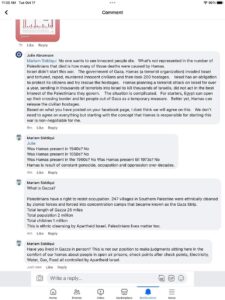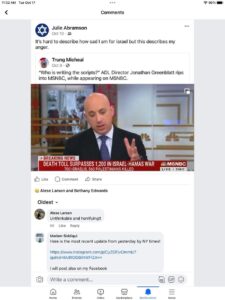This week, Julie Abramson was surprised to see a new comment on an Oct. 10 Facebook post about her sadness after Israel was brutally attacked by Hamas, the terrorist organization that controls Gaza.
Unprompted, Mariam Siddiqui, a candidate for Wayzata School Board, commented with an instagram graphic from the New York Times showing Israeli and Palestinian death tolls in the region since 2008, updated for the current Israel-Hamas war.
Abramson had seen Siddiqui’s personal Facebook profile, where she reshared images of Palestinians in Gaza under Israeli airstrikes, alongside anti-Israel videos and posts from Shaun King, a controversial Black Lives Matter activist.
So Abramson, a Jewish parent of a sophomore at Wayzata High School, felt she had to respond.
“We don’t need to agree on everything, but starting with the concept that Hamas is responsible for starting this war is non-negotiable for me,” she wrote, at the end of a paragraph outlining Hamas’ attack and their control of Gaza.
Siddiqui had a different take spread across several replies.
“Hamas is a result of constant genocide, occupation, and oppression over decades,” Siddiqui wrote.
She outlined statistics about Gaza such as its population of roughly 2 million, including about 1 million children, and called Gaza a concentration camp and an open-air prison.
“Palestinians have a right to resist occupation,” Siddiqui wrote, with current Israeli airstrikes amounting to “ethnic cleansing by apartheid Israel. Palestinian lives matter, too.”
To Abramson, these comments crossed a clear line into antisemitism. After Hamas murdered over 1,400 civilians in Israel on Oct. 7 and took 200 hostages, many Israelis and Jews see framing Hamas in terms of resistance as an endorsement of murdering Jews.
The comments are of deep concern to Abramson and other Jewish parents at Wayzata given Siddiqui’s candidacy for the school board. There are four open seats in the Nov. 7 elections, with six candidates running. School board members serve four-year terms.
“Whoever represents the school board has to represent what’s being taught in the schools, and what’s being taught in the schools is to respect each other’s differences and diversity,” Abramson said. Siddiqui’s “comments weren’t respectful to any Jewish family…I think she’s unfit to be a school board member.”
Asked to address the concerns of her potential constituents, Siddiqui defended her views and, unprompted, condemned Hamas’ attack.
“There is no justification of any evil action by any group of people,” she said over Facebook Messenger. Neither “Hamas or nobody should be allowed to harm innocent lives.”
Siddiqui said regardless of her comments that everyone, Jewish and non-Jewish, has a place at Wayzata.
“I have so many wonderful Jewish friends and I like them a lot,” she said. “Everybody is welcome not only at Wayzata but everywhere.”
Her comments about Hamas were based on facts, Siddiqui said, and she didn’t understand why Abramson felt offended by her Facebook responses. “I always look at the books recommended and written by Jewish intellectuals, and facts and numbers available,” she said.
On Siddiqui’s campaign Facebook page in response to someone else, she suggested reading “The Biggest Prison on Earth,” a book about the Palestinian territories by Ilan Pappe, a controversial Israeli anti-Zionist historian described by his contemporaries as sloppy and dishonest.
“There are so many nice candidates you can all vote for, if you guys don’t like me,” Siddiqui said.
Siddiqui’s views are extreme, said Ethan Roberts, deputy executive director of the Jewish Community Relations Council of Minnesota and the Dakotas – and a parent of Wayzata students.
“They are extreme in the sense that they are incredibly hostile to Israel, they’re incredibly hostile to a country that is central to many Jews’ identity,” Roberts said.
To say that “Palestinians are entitled to their resistance in a conversation about Hamas, and what they just did…that is something that I as a voter am absolutely going to take into consideration when I think about, you know, who would I want to be sitting on the school board where my kids go to school,” he said.
Roberts said that Siddiqui’s comments were also unhelpful in a time when tensions are extremely high around the Israel-Hamas war, and Jewish students and their families are feeling those tensions at school.
“You have to set a tone as a school board member, and this is absolutely the opposite of what you would want from a school board member,” Roberts said.
This year isn’t Siddiqui’s first run for Wayzata School Board. In 2021, she received just 2.7% of the vote amid 12 candidates running for three available seats. Last year, Siddiqui came in last in a four-way special election for one board seat, winning 14.45% of the vote.






Thank you for this article. I will remember the name when I vote!
Israel left Gaza in 2007. Took all the Jewish settlements with them. The PLO took charge. Since then (17 years now) the Palestinians have received 100’s of millions of $ to rebuild THEIR land. What did they do? Please keep asking that question as to why it’s the “biggest prison”. Whose fault & responsibility is that? Don’t buy into the lies of these defenders who continue to exploit their people.